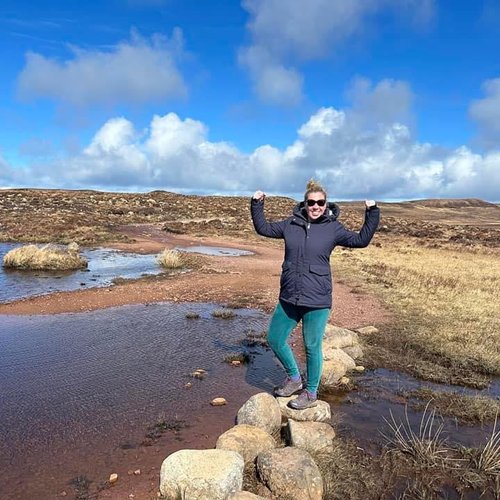"I felt like such a burden to everyone" - Jen's ARFID story
Jen lives near Edinburgh with her husband, Neil.
She is an instrumental music instructor who enjoys all things music, art, and getting outside in nature.
She first heard about ARFID when she was researching ways to spot the early signs of eating disorders among her students.
This is Jen's story...

Unlike a lot of people, I can pinpoint exactly when I developed ARFID. About 10 years ago, I got food poisoning and soon after that I got salmonella. It wasn’t my best year! I kept thinking I’drecovered, but the IBS-type symptoms I’d developed carried on affecting me. It was quite stressful and I tried to manage my symptoms by restricting my diet. I began by trying to eat lighter foods, but it quickly escalated into limiting myself to a handful of trusted foods, and not eating outside my house or my workplace.
I’d had a few accidents out and about, and I thought that by living like this, I could prevent them in future. This mostly worked, but it took up pretty much all my mental energy. I tried to get to the bottom of why I was still struggling with my IBS-type symptoms, and eventually I spoke to a dietician. She really helped me get my gut health back on track, and soon my physical symptoms cleared up.
My husband wanted to go out and explore at the weekends, but I found the idea terrifying
At that point, most people would be able to go back to eating as they had before. For some reason, I just couldn’t. It was like my brain hadn’t caught up with my body, and was stuck only being able to eat my trusted foods, in my trusted locations. By now I was living in Dubai with my husband. My husband wanted to go out and explore at the weekends, but I found the idea terrifying. Even though I wasn’t getting any physical symptoms any more, I needed hours to prep for going somewhere new.
I’d spend the time on google, working out where all the closest toilets were, and even then I couldn’t eat until we got home. To begin with, my friends and family didn’t notice anything was wrong. My husband knew, and a few close friends, but I was good at hiding it.
Instead of asking if everything was ok, people told me I looked great.
I think it was easier because people didn’t think I looked like I had an eating disorder. I did lose a bit of weight, but instead of asking if everything was ok, people told me I looked great. I’ve seen photos of myself from that time, and I think I looked awful; worried, exhausted and ill.
I can’t believe how much mental energy it took for me to sustain my ARFID. I was exhausted all the time, and I felt like such a burden to everyone. I knew I had to do something, so during a visit back to the UK I went to see my GP. I explained how I thought the problem was in my mind now rather than my body, but I was just handed a leaflet on IBS and told to get on with it. I began to think no one would ever understand. Then one day I was scrolling through Instagram and I saw an advert for Beat’s SPOT training programme.
I felt so validated and seen: I wasn’t the only one living like this.
I’m a teacher, so I thought it would be really useful to know a bit more about spotting the early signs of an eating disorder in the children I teach. When I got to the bit about ARFID, I could have been reading about myself. I felt so validated and seen: I wasn’t the only one living like this, my condition had a name, and I could get better. That was the beginning of my recovery. Over the last 5 years I’ve found ways to help myself manage my anxiety around food, and slowly but surely I’ve found it easier.
Writing down my worries really helps me, somehow they just feel less scary if they’re organised on a page rather than jumbled up in my head. I still struggle sometimes if I’m really busy, or haven’t had enough sleep. The fear of food can begin to creep in again. But I trust myself to know what I need to stay in recovery now, which is a really powerful feeling.
More ARFID stories...
22 February 2024
Eating Disorders Awareness Week case study: Victoria's ARFID story
Read more1 February 2024
Our supporter Frankie shares their experience of discovering they have ARFID, and how far they've come in their recovery
Read more26 September 2023
Our supporter Chloe shares her experience of living with ARFID, and her hopes for better understanding of the eating disorder
Read more